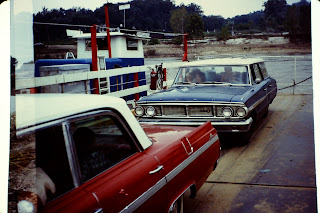Do you find that there are questions that come up repeatedly in your life? I do. The one that comes up most for me is; "Is this the way this is supposed to be? Really?"
Whether it was my Mother's cooking, my hand-me-down clothes, the level of parental oversight (or lack thereof) or my Dad's unsympathetic approach to everything, I have always and still find myself asking, "Was this supposed to turn out this way?" Most times, I'm convinced it wasn't.
When I was five, I got Tonsillitis. Most kids do at some point. My case was pretty bad. I remember staying home sick which in and of itself was remarkable. But I also remember the doctor being fairly alarmed at the state of my condition when I was finally taken to him. He wanted me in the hospital right then - immediately. My Mother was told not even to bother taking me home. She told him 'No.' Instead, she chose the 'prescription and return home' option. Since part of the prescription - along with the antibiotics - was that I begin chewing gum, I guess I was okay with it too. I was never given gum and I remember how much it hurt when I tried to chew it. (Was it always like this?) My whole jaw ached with each 'chew.' It was only then that I knew I must have been pretty sick. I couldn't eat. I had alarmed the pediatrician. My Mom was indifferent. (Was her reaction normal?)
It was almost Halloween. Because was sick, I couldn't go out Trick-or-Treating. So not fair and definitely not how I thought it should be. But neither was the impending trip to the hospital that I knew lay nearer and nearer on the horizon. I was so scared. (Was I supposed to be scared?) But I had heard stories that there would be ice cream - all I wanted - and that I wouldn't remember a thing. Even at five years old, I understood the implicit value of being able to block things from my mind.
My parents took me to the hospital in the evening. I would be having a Tonsillectomy the next morning. They walked me to my room, helped me change and put me in bed. They said goodbye and they left. That night was one of the most unsympathetic exchanges and the loneliest nights of my life. I remember the sound of my Mom's shoes fading down the hallway. Nobody came. Nobody told me what to expect. Nobody told me what to do if I needed a bathroom. Nobody told me if I was supposed to sleep with the lights on. Nobody did anything. (Was this how it was meant to be?) The only thing anyone told me is that there would be ice cream and so far I hadn't been offered any.
Finally, I had to go to the bathroom so bad I got up and walked out of my room to the hallway to find a bathroom. As I came out a nurse scolded me for getting up and hurriedly put me back to bed and turned out the light. I thought nurses were supposed to be caring. (Was this how it was supposed to be?)
I woke up the next day with a pain in my throat worse than I have ever experienced. My parents still weren't there. I felt groggy and the kids in the other beds were watching cartoons with their parents. A nurse brought me breakfast - scrambled eggs and toast. My Mother showed up - she put salt on the eggs and told me to try and eat. Can you imagine how salted eggs felt on my skinned throat? Still no ice cream. (Really? Was this how it was meant to be?)
A day or two later, my Mother came to pick me up and take me home - which was fine because I had still not been given a single dish of ice cream by anyone. I was still very sick and could barely keep awake as I lay on the blue vinyl backseat of the car on the ride home. She wanted to take me to lunch on the way - because I had been brave. We stopped at one of my favorite restaurants. She ordered me hot dogs and fries - with ketchup, plenty of ketchup. Again - not the wisest choice for a kid who just had her throat torn off in two places. I still remember how good it smelled and how bad it felt. I was done after one bite, but I sat while my Mother ate her lunch. (Was this how it was supposed to be?)
No. Not at all.
Congrats to Laura Dekker!
14 years ago









































